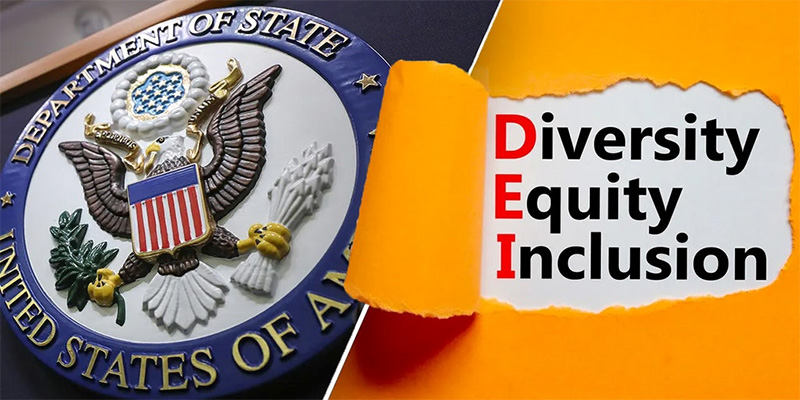
The State Department’s practices of diversity, equity and inclusion (DEI) hiring has led to potential inefficiencies in hiring and concerns about the quality of employees in the foreign service, according to a report from The Heritage Foundation, FOX News reports.
"Ideologically driven bureaucrats at the State Department are severely undermining U.S. diplomacy by artificially engineering equal outcomes in hiring and personnel decisions, through overriding objective criteria," Simon Hankinson, senior research fellow at The Heritage Foundation’s Border Security and Immigration Center and author of the report, told Fox News Digital.
"The world is on fire right now — as seen by the conflicts in Ukraine, Israel and Taiwan. Yet, the State Department is wasting limited resources on an agenda that does not advance American interests and is not supported by data," Hankinson, who also served as a foreign service officer, said.
The report focuses on the hiring practices of the Foreign Service, which provides personnel to the U.S. diplomatic services and consists of over 13,000 professionals, insisting that the service must select its employees through "objective, meritocratic criteria and are accountable to the president."
State Department spokesperson Vedant Patel argued during a press conference Thursday that the department welcomes "diverse points of view and believes it makes us a stronger department, and it makes and leads to a stronger policymaking process."
According to the report, 35% of the current 26,000 civil service and foreign service employees are identified as "minority," citing the State Department’s permanent workforce diversity data as of Sept. 30, 2023. Additionally, the report claims racial percentages within the workforce are "within 10% of the national levels."
The report quotes former State Department Director of Recruitment Woody Staeben as arguing eight years ago that the number of White officers among new hires had dropped by 30%, but that "it will take much longer for the overall figure to change because the average Foreign Service career spans 27 years," meaning that issues with the makeup of the workforce reflect a delayed reaction to the makeup from years prior.
The report’s most striking point — that the department stresses employees are held accountable to the president — derives from perceived resistance within the State Department to former President Trump’s policies, such as efforts to control illegal immigration, leading the report to accuse the State Department of having an increasingly left-leaning bias and arguing the bias derives from universities.
"Although there are approximately 65 appointees at State, (not including ambassadors), they are often unable to change policy in line with the vision of the President, due to bureaucratic inertia, ignorance of how things are done, and resistance from entrenched career officials," the report says. "This systemic paralysis is a fundamental challenge to the principle that elections should result in policy changes."
The most significant issue the report finds is the lack of emphasis on the Foreign Service Officer Test (FSOT), which former Chief Diversity and Inclusion Officer Gina Abercrombie-Winstanley dismissed as having "zero correlation to being a successful diplomat" while more subjective oral exams helped test for "racists, or sexists, or homophobes or ableists," which she determined as "things that we need to be screening for."
"Those who have the vast majority of senior [foreign service] positions are primarily European American men… You don’t get to 87% of one group that is not 87% of the population and feel confident that all of those selections were made on the basis of merit," Abercrombie-Winstanley said during her 2023 testimony on diversity practices at the State Department.
"It stands to reason that accepting applicants with lower FSOT scores will lead to lower performance as those officers move through their careers, both to their own and to the service’s detriment," according to the report. "The State Department’s Board of Examiners reportedly did not conduct any empirical research to determine whether higher FSOT scores correlated with career performance before deciding to de-emphasize the test."
read more in our Telegram-channel https://t.me/The_International_Affairs

 8:50 09.06.2024 •
8:50 09.06.2024 •






















